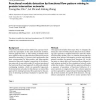126 search results - page 16 / 26 » Next generation sequencing in functional genomics |
BMCBI
2007
13 years 8 months ago
2007
Background: Incorrectly annotated sequence data are becoming more commonplace as databases increasingly rely on automated techniques for annotation. Hence, there is an urgent need...
BMCBI
2011
13 years 3 months ago
2011
Background: In many environmental genomics applications a homologous region of DNA from a diverse sample is first amplified by PCR and then sequenced. The next generation sequenci...
BMCBI
2007
13 years 8 months ago
2007
Background: Large-scale sequencing of entire genomes has ushered in a new age in biology. One of the next grand challenges is to dissect the cellular networks consisting of many i...
BMCBI
2008
13 years 8 months ago
2008
eraction networks. In this abstract, we extend this approach by mining functional flow patterns for the purpose of detecting small-sized modules for specific functions. Methods Our...
BMCBI
2010
13 years 8 months ago
2010
Background: Finishing is the process of improving the quality and utility of draft genome sequences generated by shotgun sequencing and computational assembly. Finishing can invol...

